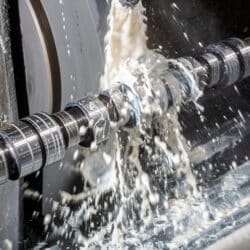Hydraulic Oil – The Essential Guide
The Essential Guide to Hydraulic Oil:
What It Is, Types, Additives, and Benefits
Hydraulic oil, also known as hydraulic fluid, is a critical component in hydraulic systems, powering everything from heavy industrial machinery to construction equipment. It plays a key role in ensuring smooth operation, enhancing performance, and protecting components. In this guide, we will explore what hydraulic fluid is, the different types and technologies available, the additives that boost its performance, and the many benefits it offers. Additionally, we’ll look at some top-quality hydraulic oils available from Kernow Oils, a trusted supplier of industrial lubricants.
What is Hydraulic Oil?
Hydraulic oil is a specially formulated fluid used in hydraulic systems to transfer power. Hydraulic systems rely on the fluid’s ability to transmit force through pressurised liquid to operate machinery, lifting and moving loads. It serves multiple functions, including lubrication, heat dissipation, and corrosion protection. Hydraulic oils are used in various applications, from manufacturing machinery to construction equipment, agricultural machines, and even aircraft systems.
The fluid is typically a blend of base oil (mineral oil, synthetic oil, or bio-based oil) and a mix of additives designed to enhance its properties. The choice of hydraulic fluid depends on the specific machinery, operating environment, and the type of work being performed.
Types of Hydraulic Oil and Their Technologies
There are several types of hydraulic fluid available, each formulated to meet the unique demands of different hydraulic systems. These oils vary based on their base oils, additives, and intended use. Let’s explore the key categories of hydraulic oils:
1. Mineral Oil-Based Hydraulic Oil
Mineral oil-based hydraulic oils are the most common type used in industrial applications. These oils are derived from crude oil and are blended with various additives to improve performance. Mineral oils are affordable, readily available, and provide good performance for general-purpose hydraulic systems.
- Benefits: Cost-effective, good lubrication properties, and widely used in non-extreme conditions.
- Applications: Manufacturing machinery, agricultural equipment, and construction vehicles.
2. Synthetic Hydraulic Oils
Synthetic hydraulic oils are man-made fluids that offer superior performance compared to mineral oils, particularly in high-temperature and high-pressure environments. These oils have a more stable chemical structure, offering better protection for machinery and reducing the risk of breakdowns.
- Benefits: Enhanced thermal stability, better oxidation resistance, and superior performance under extreme conditions.
- Applications: Aerospace, high-performance manufacturing, and extreme operating environments.
3. Biodegradable Hydraulic Fluids
As industries face increasing environmental regulations, biodegradable hydraulic fluids have gained popularity. These fluids are made from renewable resources and break down more quickly in the environment compared to traditional oils. They are particularly useful in sensitive environments such as forestry, agriculture, and marine applications.
- Benefits: Environmentally friendly, quick biodegradability, and minimal environmental impact in case of leaks or spills.
- Applications: Forestry equipment, marine applications, and agricultural machinery.
4. Water-Based Hydraulic Fluids
Water-based hydraulic fluids are a blend of water and additives, offering a non-flammable alternative to mineral and synthetic oils. While they are not as commonly used in heavy-duty applications, they are effective in light-duty systems that require fire-resistant fluids.
- Benefits: Fire-resistant, cost-effective, and environmentally friendly.
- Applications: Some manufacturing industries, where fire safety is a concern.
Additives in Hydraulic Oil
The performance of hydraulic fluid is greatly enhanced by the inclusion of various additives. These additives improve the fluid’s properties, ensuring that it functions optimally in a variety of conditions. Here are the key additives commonly found in hydraulic oils:
1. Anti-Wear Additives
Anti-wear additives reduce friction between moving parts in the hydraulic system, minimizing wear and extending the lifespan of components. These additives form a protective layer on metal surfaces to reduce direct contact between them.
2. Oxidation Inhibitors
Oxidation inhibitors prevent the breakdown of hydraulic fluid due to exposure to heat and oxygen. This helps to extend the fluid’s life and maintain its effectiveness over time. These inhibitors also reduce the formation of sludge and varnish, which can block filters and cause system failures.
3. Rust and Corrosion Inhibitors
Rust and corrosion inhibitors protect the hydraulic system from moisture and contaminants that can cause corrosion of metal parts. These additives form a protective layer on the surfaces of components, ensuring the longevity of the system.
4. Viscosity Index Improvers
Viscosity index improvers help maintain the oil’s viscosity across a wide range of temperatures. Hydraulic systems often operate in environments with fluctuating temperatures, and the oil must remain at the correct viscosity to ensure efficient operation. These additives allow hydraulic oil to perform optimally in both cold and hot conditions.
5. Demulsifiers
Demulsifiers help separate water and oil in hydraulic fluids. In systems that are exposed to moisture, water can mix with the oil, affecting its performance. Demulsifiers help the oil separate from the water, preventing the formation of emulsion and ensuring smooth operation.
Benefits of Using Hydraulic Oil
Hydraulic oils offer a range of benefits that enhance the performance, efficiency, and longevity of hydraulic systems. Let’s explore the top benefits of using high-quality hydraulic fluid:
1. Improved Efficiency and Performance
High-quality hydraulic fluid ensures that hydraulic systems operate smoothly by reducing friction and preventing overheating. This leads to improved efficiency, higher productivity, and smoother operation, even under heavy loads and high pressures.
2. Increased Equipment Lifespan
Hydraulic oil acts as a lubricant for moving parts, reducing wear and tear on components. By reducing friction and providing adequate lubrication, the fluid helps extend the lifespan of pumps, cylinders, motors, and other hydraulic components.
3. Corrosion and Rust Protection
Hydraulic systems are susceptible to moisture, which can cause rust and corrosion on internal components. The right hydraulic fluid, enriched with rust and corrosion inhibitors, ensures that the system is protected, preventing costly repairs and downtime.
4. Heat Dissipation
Hydraulic oil helps dissipate the heat generated during hydraulic operations, maintaining an optimal operating temperature. This reduces the risk of overheating, which can lead to system failure or damage to components.
5. Environmental Protection
Biodegradable hydraulic fluids offer environmental protection in case of leaks or spills. These oils break down more easily in the environment, reducing the risk of contamination and ensuring compliance with environmental regulations.
6. Cost Savings
Properly maintained hydraulic systems, using the right hydraulic fluid, require less frequent repairs and component replacements. The extended lifespan of both the fluid and the components results in significant cost savings over time.
Hydraulic Oil Products from Kernow Oils
Kernow Oils offers a range of high-quality hydraulic oils designed to meet the needs of various industries.
1. Mineral
Premium mineral-based hydraulic fluid designed for general-purpose hydraulic systems. It offers excellent wear protection, oxidation resistance, and water separation properties, making it ideal for use in a wide range of applications.
2. Bio
For businesses looking to reduce their environmental impact, Bio Oil is a biodegradable, environmentally friendly option. This oil is designed to offer the same high performance as traditional oils while being more eco-friendly, ideal for industries where environmental impact is a concern.
3. Synthetic
For high-performance and extreme conditions, Synthetic Fluid offers enhanced thermal stability and superior oxidation resistance. This synthetic oil is perfect for use in high-pressure and high-temperature environments, providing optimal performance and extended fluid life.
How to Choose the Right Hydraulic Oil
Choosing the right hydraulic fluid depends on several factors, including the type of hydraulic system, operating conditions, and the manufacturer’s specifications. Here’s how you can make the right choice:
- Understand the Application: Determine the type of machinery and the environment in which it will operate. For example, if you’re operating in extreme temperatures or high-pressure conditions, a synthetic or high-performance oil may be necessary.
- Check Compatibility: Ensure the oil is compatible with the materials used in your hydraulic system to avoid degradation or damage.
- Consider the Additives: Look for oils with the right additives to meet the needs of your equipment, such as anti-wear, oxidation inhibitors, and corrosion protection.
- Consult Manufacturer Specifications: Always consult the hydraulic system’s manufacturer guidelines to choose the right oil grade and type.
Conclusion
Hydraulic oils are essential for the smooth operation, efficiency, and longevity of hydraulic systems. Whether you choose mineral oil, synthetic oil, or biodegradable fluid, selecting the right hydraulic fluid ensures optimal performance, reduced downtime, and long-lasting equipment. Kernow Oils provides a comprehensive range of hydraulic oils, including Hydraulic Oil, Bio Hydraulic Oil, and Synthetic Hydraulic Fluid, all designed to meet the demands of various industries and applications.
For more information on high-quality hydraulic oils and other industrial lubricants, visit Kernow Oils and explore the full range of products tailored to your business needs. Alternatively, learn more about the benefits of Castrol hydraulic fluids by visiting our blog page ‘Castrol Hydraulic Oil – The Essential Guide’.
December 18, 2024






